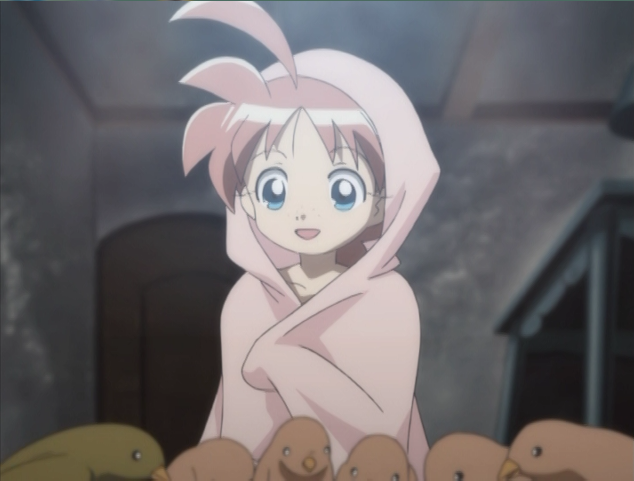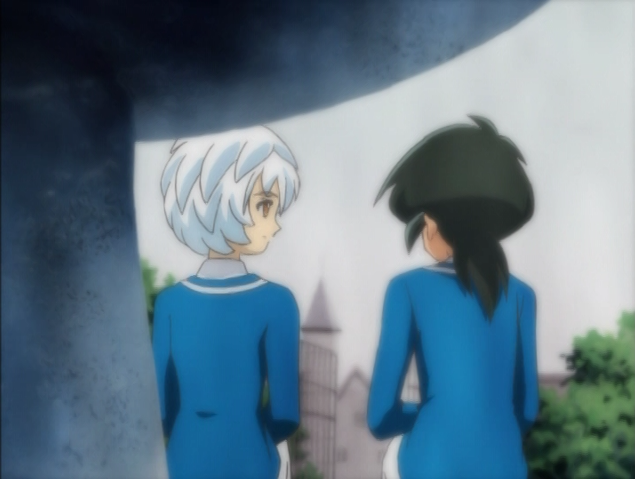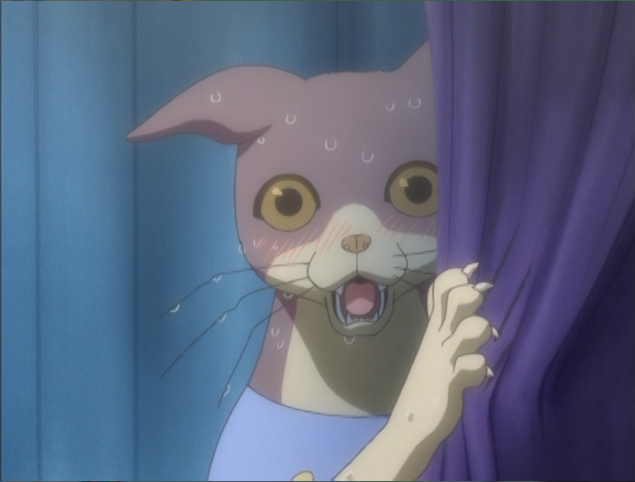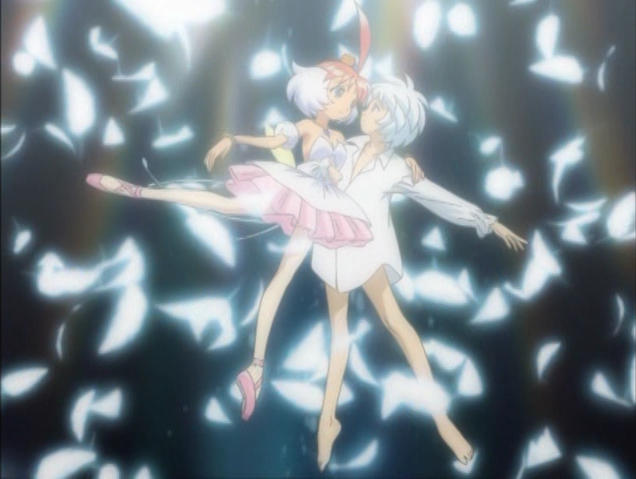Once upon a time there was a man who died. The Prince and the Raven from the man’s story escaped from its pages and did battle…
“The Raven” acts as a sort of reprise to “The Duck and the Prince”, repeating certain scenes and images with new themes and ideas woven in. The opening scene (the dream) is the most striking in that sense: It begins exactly the same as the first scene in Episode 1, with Duck and Mytho on the pond, then shifts to a pas de deux that looks a lot like Duck’s little imagine spot of such an event (also from episode 1), before taking a grim turn with the “Prince” changing into Fakir miming death.
This is the first episode of the ”Chapter of the Fledgling” (the first season was “Chapter of the Egg”), and since Michiko Yokote was writing this without the aid of Sato’s storyboards, it was a brilliant move to borrow the imagery from Episode 1. It simultaneously evokes a new beginning of sorts and reminds you of how much has changed.

The first half of the episode is just a glorious “peaceful day”, as Drosselmeyer puts it. Mytho is more princely than ever and Fakir’s roughness is really just for show at this point.
Duck: Rue…She’ll come back, right? Rue is Rue, right? She’s definitely not Princess Kraehe, right?
Duck herself has changed just as much as the others, even if she might not look it. She has a lot more worries now, concerned about the wellbeing of everyone else in the story. Fakir goes out of his way to ease one of her worries, at least, staging a conversation with Mytho about Princess Tutu.
Fakir: Don’t you want to know who she is?
Mytho: Sure I do, but maybe right now it’s best for me not to know, because I’m certain there will come a day when she’ll be ready to tell me. Right now, I’m thinking more about how I have to get all of my feelings back as soon as I can, with help from Princess Tutu. […] And when that’s finished, I’ll go back into the story. As the story’s Prince, I belong there.

Mr. Cat plays a significant role in this episode, and I just have to mention the adorably cattish mannerisms he occasionally displays (like the scene where he’s transfixed by Duck’s hair-thingy in Episode 12). As I’ve mentioned before, his character is never “explained”, but we will get a few hints about his past this season – not enough to piece anything together, but enough to give him some surprising depth. This episode it’s all just setup to let us know that something’s gone horribly wrong with Mytho.

Fakir: Hey, Mytho! Look at me. Is there something going on inside you now?
Mytho: What if something is? Will you again seek to pierce my heart? But isn’t that sword gone now? Didn’t you break it?
Then we finally hear from Rue/Kraehe, and find out how exactly she’s related to the Raven: She’s his daughter. There’s some rather clunky exposition about how she soaked the shard of Love in Raven’s blood before Tutu returned it to Mytho, which was all a part of the Raven’s plot to corrupt the Prince so he’ll “love crows”, which Kraehe is totally on board with because the end result is Mytho marrying her.

After Fakir confronts Mytho, Mytho jumps out the window, and Duck saves him by transforming into Princess Tutu (one last echo of Episode 1). The sight of Princess Tutu draws Mytho out of his Raven-induced evilness, but unlike in Episode 1, there were a lot of people around to see Mytho fall out of his window.
Drosselmeyer: Bravo! At last the second act begins. Oh dear! the Knight, the Prince, and the two Princesses – it seems their roles will change just a bit. Now tell me a fantastic story. I’m looking forward to it, Princess Tutu…
Just a little technical note about the format of the episodes in season 2: They were originally aired as two 15-minute halves in Japanese, one half each week. This doesn’t directly affect the story (aside from the two halves being a bit more distinct), and on the upside, the animation is often noticeably better this season, as the animators had twice as long to work on each episode.
Until next time…